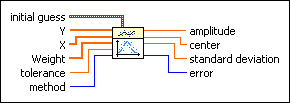 |
initial guess specifies the initial guesses of amplitude, center, standard deviation, and offset for use in the iterative algorithm. If initial amplitude, initial center, initial standard deviation, or initial offset is NaN, this VI calculates the initial guess automatically.
 |
initial amplitude is the initial guess of amplitude.
|
 |
initial center is the initial guess of center.
|
 |
initial standard deviation is the initial guess of standard deviation.
|
|
 |
Y is the array of dependent values. Y must contain at least three points.
|
 |
X is the array of independent values. X must be the same size as Y.
|
 |
Weight is the array of weights for the observations (X, Y). Weight must be the same size as Y. Weight also must contain non-zero elements. If an element in Weight is less than 0, the VI uses the absolute value of the element.
If you do not wire an input to Weight, the VI sets all elements of Weight to 1.
|
 |
tolerance determines when to stop the iterative adjustment of amplitude, center, and standard deviation. If the relative difference of the weighted mean error of the Gaussian fit in two successive iterations is less than tolerance, this VI returns the resulting amplitude, center, and standard deviation.
If tolerance is less than or equal to 0, this VI sets tolerance to 0.0001.
|
 |
method specifies the fitting method.
| 0 | Least Square (default) | | 1 | Least Absolute Residual | | 2 | Bisquare |
|
 |
amplitude returns the amplitude of the fitted model.
|
 |
center returns the center of the fitted model.
|
 |
standard deviation returns the standard deviation of the fitted model.
|
 |
error returns any error or warning from the VI. You can wire error to the Error Cluster From Error Code VI to convert the error code or warning into an error cluster.
|

 Add to the block diagram
Add to the block diagram Find on the palette
Find on the palette




